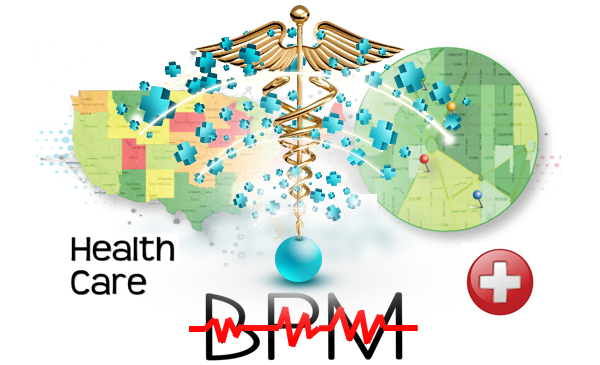BPM Healthcare Solutions – Overcoming the ACA
Change is coming to the healthcare industry. Defining and managing business processes using modern solutions will soon be paramount in overcoming the many business obstacles surrounding the ACA (Affordable Care Act). Healthcare providers have to start value selling. Historically, healthcare providers have been able to sit back and let the patients come to them. We are now seeing a shift from market dominance to a competition-based models, where the rising cost of hospital technology and staffing shortages have to be offset by strategic marketing and the ability to increase profits without adding human capital.
What does BPM (Business Process Management) mean to the healthcare industry?
Healthcare providers have to now become even more competitive. They now have to win the mindshare of patients and market their services just like any other service company. The issue is that healthcare providers have a much more complex process than most — they have to deal with proper licenses, Doctor location, availability while also making sure they are hitting the right target audience. The ideal patient profile can vary from age to illness or a combination of both. With such details to consider and the shortage of workers, technology is being used to automate these processes to minimize the impact being felt across the healthcare industry.
How do BPM solutions for healthcare solve these obstacles?
The first step in this healthcare business renaissance is to define business processes. As this has been a completely new shift from the old way of doing things to the new, it’s important to recruit the right stakeholders within your organization and create a strategic process model. Once your processes are defined and documented, the proper BPM solution must be put in place to animate what has been discovered, giving your changing business the ability to adapt and grow. With the proper ROI from their technology, hospitals will be able to reallocate capital spending back to special research projects or other infrastructure improvements.
Who benefits from implementing a BPM solution?
Under the ACA, hospitals with a higher readmission rate will be paid by Medicare at a much lower rate. This is one of the major driving forces for this change in healthcare business. The ACA puts an emphasis on patient care and readmission rates, which changes how hospitals are paid for services. Hospitals also have to deal with a flood of newly insured patients and need to be able manage the additional workflow on time and maintain optimal patient care; all while having less resources due to staffing shortfalls.Staffing shortages are due to the increasing demand for healthcare workers and as hospitals become more competitive it’s only going to get worse. These shortages are responsible for many other critical business issues within this industry including medical errors and administration disorganization.
As the laws put forth by the ACA are adopted and implemented if processes aren’t defined and automated, hospitals will earn less for their services because of readmission and the influx of new patients; resulting in an inability to add the additional workforce needed.
How else is the healthcare industry effected?
We have also seen a similar change in the Locum Tenens industry. These agencies specifically deal with placing healthcare professionals and are taking a look at their processes and adopting technology to assist with the greater demand. A case study detailing how we have used technology to animate a defined process strategy within this industry will be coming in a later blog post.
author bio
Sonja Fridell
Sonja is very active in architecting CRM, ERP and marketing automation solutions for clients across North America. As an ex-journalist, she is adept at exploring a client’s needs and coming up with cutting edge, elegant solutions that fit, drive adoption, and create real results.
view all articles
Stay in the Loop
Subscribe to get all our latest content sent directly to your inbox!





